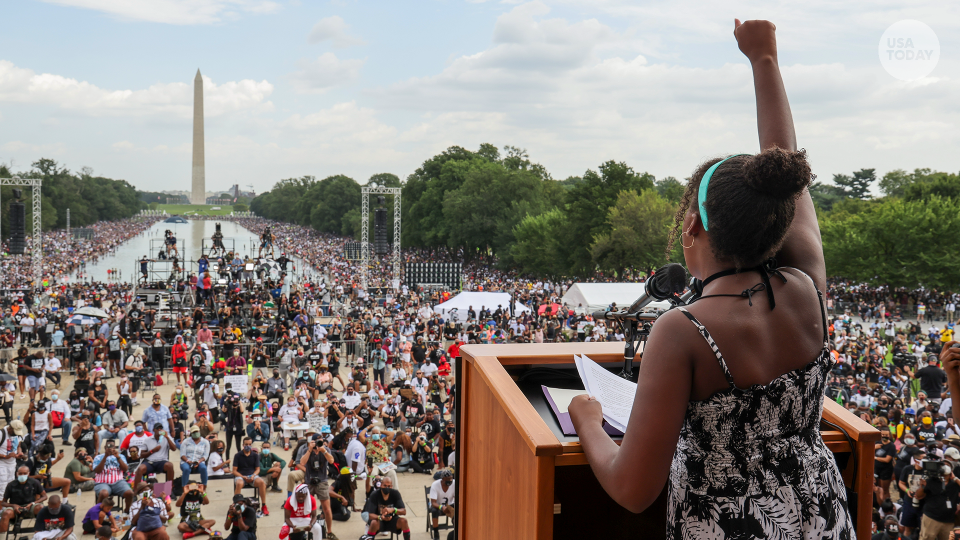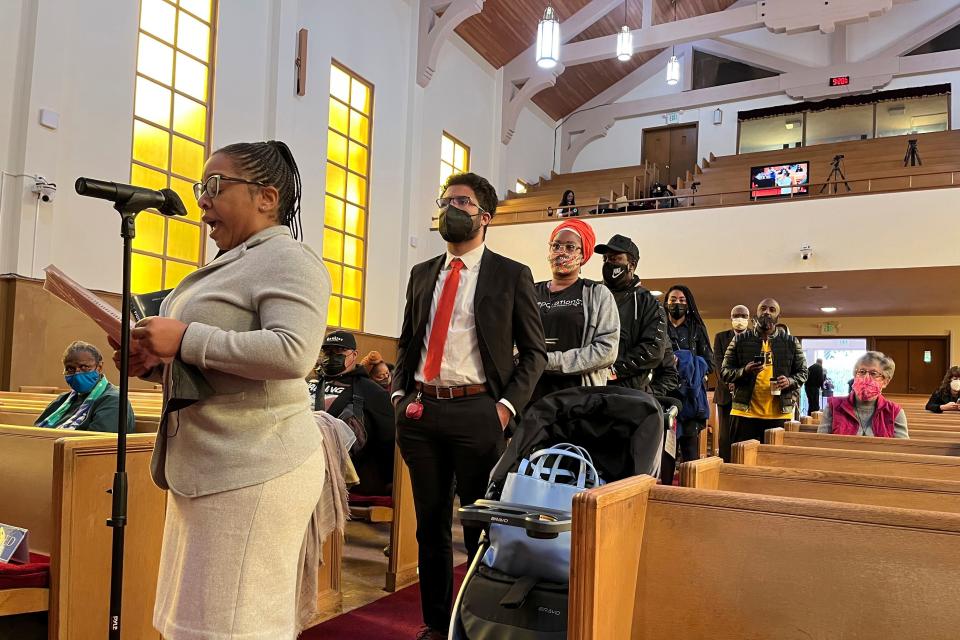'Failed promises': Black Californians may soon get reparations. What would they be owed?
Reparations could be coming for Black Californians who are descendants of those enslaved in the United States.
The California Reparations Task Force publicly released its final report in Sacramento Thursday with a list of dozens of recommendations for state lawmakers to consider in a plan to compensate eligible African Americans for financial losses brought on by slavery and decades of institutional racism.
“Show me the statute of limitations on the world’s greatest crime against humanity," said Lisa Holder, a civil rights attorney and task force member.
The task force's recommendations include and go beyond cash payments for individuals who are eligible. The group is calling for sweeping policy changes to compensate Black Californians for the long-standing harms and loss of generational wealth brought on by state policies that have led to housing discrimination, overpolicing and mass incarceration, devaluation of African American businesses and unjust property seizures by eminent domain, among other harms.
Members of the task force emphasized Thursday that the long-standing consequences of the nation's enslavement of Black people lingers across the state.
"What do we want? Reparations!" one person led the audience in chanting during the public comment portion of Thursday's hearing. "When? Now!"
What happens next in California?
The state Legislature and Gov. Gavin Newsom will now be tasked with weighing the task force's recommendation and crafting bills to move forward. Those eligible won't see the reparations until at least 2024. "It likely won't happen with one legislative cycle or two legislative cycles, or one bill," California State Sen. Steven Bradford, a task force member, said Thursday.

The task force's proposals are part of a national call for reparations for African Americans in the wake of persistent racial disparities in the United States that gained traction after George Floyd was murdered by a white police officer in Minneapolis in May 2020. The final recommendations came the same day the U.S. Supreme Court blocked race-conscious admissions used to diversify campuses at Harvard University and the University of North Carolina.
What are the task force's recommendations?
"The African American story in the United States is marked by repeated failed promises to right the wrongs of the past – both distant and recent – and failure to acknowledge and take responsibility for the structural racism that perpetuated these harms," the report reads.
After two years of considering the best ways to compensate Black Californians, the nine-person committee is recommending state lawmakers consider the following:
Granting financial redress through varying amounts of cash payments and creating an agency to handle compensation claims.
Developing policies to close racial wealth gaps.
Affording free tuition to state colleges, including Universities of California and California State Universities.
Allocating funds "to remedy harms and promote opportunity."
Funding "community-driven solutions to decrease community violence at the family, school and neighborhood levels in African-American communities."
Other recommendations listed in the report include abolishing the death penalty, repealing Proposition 209 and advancing "the study of the intergenerational, direct and indirect impacts of racism and removing the "barrier of proving identity to vote."
The group also recommends the state Legislature on its own behalf and on behalf of the state issue a formal apology with a request for forgiveness that "both acknowledge and express regret for what was done to victims and their relatives."
California reparations What to know about the plan to give billions to Black residents
The recommendations are meant to be used for "compensation, rehabilitation, and restitution for African Americans, with a special consideration for descendants of persons enslaved in the United States," reads the state of California Department of Justice's Office of the Attorney General's website.
Why is California looking at reparations for Black people?
Then-assembly member and now Secretary of State Shirley Weber wrote AB 3121 calling for the creation of the task force, and Newsom signed the bill in Sept. 2020. The recommendations could cost the state about $800 billion, economists told the group.
"This state has committed a crime against Black folks and it's time for them to pay their crime deal," Amos C. Brown, a member of the task force and the national board of directors of the NAACP, said Thursday. "That's what this reparation is about. For the good of America."
The group considered several factors when crafting the proposals, including "the legal and factual discrimination against freed slaves and their descendants from the end of the Civil War to the present, including economic, political, educational, and social discrimination and the lingering negative effects of the institution of slavery on living African Americans and on society in California and the United States," they wrote in a preliminary draft report.
How much money could those eligible receive?
Though the report goes beyond individual payments, some of the compensation people will be owed varies and depends on several factors. Those include "health harms," "mass incarceration and overpolicing of African Americans," "housing discrimination," "unjust property takings by eminent domain" and "devaluation of African American businesses," according to the final report.
California-based news organization CalMatters created a calculator to estimate how much money a person could be owed. The final report lays out possible estimates of reparations owed by the state, including:
An estimated $13,619 for each year of residency in California, based on a 71-year life expectancy, for harm caused by health care disparities.
An estimated $115,260, or $2,352 for each year of residency in the state within the 49-year period between 1971 and 2020 to compensate for mass incarceration and overpolicing of Black communities.
Will other states copy California's plan?
Before Thursday's hearing, Newsom said the task forces' findings would be "a milestone in our bipartisan effort to advance justice and promote healing."
"Dealing with the legacy of slavery is about much more than cash payments. Many of the recommendations put forward by the Task Force are critical action items we’ve already been hard at work addressing: breaking down barriers to vote, bolstering resources to address hate, enacting sweeping law enforcement and justice reforms to build trust and safety, strengthening economic mobility − all while investing billions to root out disparities and improve equity in housing, education, health care and beyond," he said. "This work must continue.”
Task force member Donald Tamaki said any movement from the state of California is "going to resonate nationally."
"The fight really is now. The real work has to begin," Tamaki said.
Monica Montgomery Steppe, a task force member and San Diego City Council member, said the group was "not asking for performative justice."
"We must believe that reparations can come to fruition. We've come such a long way, and this work cannot be done in vain," she said.
'Long overdue' California reparations bill would give some Black residents compensation
What would reparations mean to Black Californians?
State Secretary Weber said at Thursday's hearing that the final report accurately shows "not just one story" but "the history and the legacy of how this nation's treated us."
Several Black Californians shared gratitude for the task force's work during public comment before the meeting. Some called on the state Legislature and Newsom to take the recommendations seriously and create action that will lead to real reparations.
"It's time for us to reap the rewards of all of the blood, sweat and tears from our ancestors," one told the task force members.

"Black America is watching," another said.
Contributing: Sarah Elbeshbishi, USA TODAY; The Associated Press
Contact Kayla Jimenez at kjimenez@usatoday.com. Follow her on Twitter at @kaylajjimenez.
This article originally appeared on USA TODAY: Reparations for Black Californians? Here's what that would look like.

